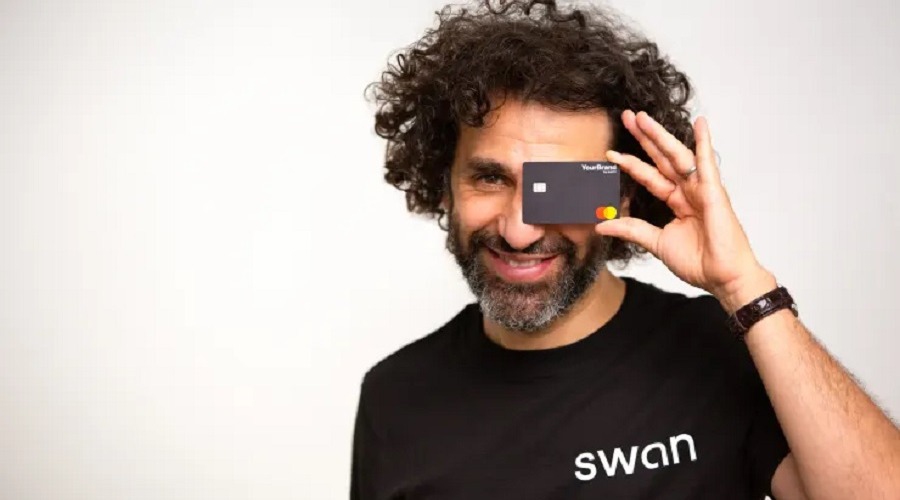
Revolut transformed
the market of everyday finance by eliminating unnecessary intermediaries and
banks with outdated offers a few years ago. Later, another revolution in the
financial market, this time in the embedded finance sector, is being prepared
by a French startup, Swan. Although the two companies are currently light years
apart, they have one common element. They both received early financial support from
the European venture capital (VC) market giant, Lakestar.
Lakestar
invested in Revolut a year after it appeared on the market when the company was
still in the early stages of being a startup. As it turned out, the VC giant had a
good feeling, as the neobanking company is worth $33 billion seven years later.
Now, when
things were going bad on the European fintech market and funding had frozen,
Lakestar went looking for a new, potential unicorn. The giant decided to give a
chance to the French startup Swan, which raised €37 million in a Series B
funding round
. The first funding round took place two years ago and was led by
Accel. In total, Nicolas Benady, the CEO and Co-Founder of the startup, raised €58 million for
development.
“Swan
is on a mission to build the leading tech-driven bank in Europe. The simplicity
and scalability of our BaaS technology is what drives our success,”
Benady commented.
Swan has
already made significant strides in Europe, with offices in France, Spain, and
Germany. The new funding will accelerate its international expansion, including
upcoming launches in the Netherlands and Italy. The company has garnered over
100 customers and processed more than €7 billion in transactions across 30
European countries. Swan’s workforce is also expected to expand in the coming
years to support this rapid expansion.
A message from our developers! 📣
Swan has open sourced our no-code banking interfaces and reduced the time to market of new pilots by 75%.Check it out: https://t.co/CpD9Q3QLk6
Article by Mathieu Breton, Swan CTO: https://t.co/5U5MJRNMHC#embeddedfinance #fintech #opensource pic.twitter.com/IjvVjebtSc— Swan (@swanapi) May 16, 2023
Embedded Finance. What Is
It?
What
exactly does Swan do? The startup operates in the embedded finance industry,
allowing institutions to combine banking services with their products. Thanks
to simple API interfaces, European companies can quickly and easily integrate
banking services (accounts, cards and payments) with their own products.
The Series
B investment will enable Swan to double down on its enterprise strategy. Previously, the
company has collaborated with large organizations like Carrefour on
successful projects. Swan plans to launch new product lines tailored for larger
organizations, including more payment collection methods and additional lending
capabilities. These new offerings will allow Swan to enter new sectors, such as
travel, insurance, and B2B marketplaces.
According
to Swan, embedded finance is poised to revolutionize the financial services
sector. About 40% of financial services, especially payments
, are expected to
be delivered through embedded solutions. The market for embedded finance is
projected to reach $384.8 billion by 2029.
“The
benefits we bring to our customers speak for themselves, with customers seeing
up to 200% ROI on projects just three months post-launch, and others able to
get up and running with a financial product in a matter of days. With Lakestar’s
support, we can bring our technology and its benefits to businesses of all
sizes, and in all sectors, as we continue to shape the future of financial
services,” Benady added.
Europe’s FinTech Sector
Faces Funding Drought
The
European fintech sector is facing a challenging situation. The funding for the
first half of 2023 dropped by 70% compared to the same period last year. In
response to this, the industry is shifting its focus towards profitability and
long-term sustainability. The cryptocurrency industry is leading the way and currently attracting the most capital.
According
to a recent report by Finch Capital, the European fintech sector raised only
€4.6 billion in H1 2023, which is a sharp contrast to €15.3 billion in H1 2022.
This decline is attributed to a return of investment discipline, which has led
to the end of mega funding rounds.
This is
consistent with another report, ‘The Pulse of Fintech‘ by KPMG in July. The
report showed that the EMEA region experienced a significant decline in
funding, falling over 50% from $27.3 billion across 963 transactions to $11.2
billion across 702 transactions in H1 2023.
Revolut transformed
the market of everyday finance by eliminating unnecessary intermediaries and
banks with outdated offers a few years ago. Later, another revolution in the
financial market, this time in the embedded finance sector, is being prepared
by a French startup, Swan. Although the two companies are currently light years
apart, they have one common element. They both received early financial support from
the European venture capital (VC) market giant, Lakestar.
Lakestar
invested in Revolut a year after it appeared on the market when the company was
still in the early stages of being a startup. As it turned out, the VC giant had a
good feeling, as the neobanking company is worth $33 billion seven years later.
Now, when
things were going bad on the European fintech market and funding had frozen,
Lakestar went looking for a new, potential unicorn. The giant decided to give a
chance to the French startup Swan, which raised €37 million in a Series B
funding round
. The first funding round took place two years ago and was led by
Accel. In total, Nicolas Benady, the CEO and Co-Founder of the startup, raised €58 million for
development.
“Swan
is on a mission to build the leading tech-driven bank in Europe. The simplicity
and scalability of our BaaS technology is what drives our success,”
Benady commented.
Swan has
already made significant strides in Europe, with offices in France, Spain, and
Germany. The new funding will accelerate its international expansion, including
upcoming launches in the Netherlands and Italy. The company has garnered over
100 customers and processed more than €7 billion in transactions across 30
European countries. Swan’s workforce is also expected to expand in the coming
years to support this rapid expansion.
A message from our developers! 📣
Swan has open sourced our no-code banking interfaces and reduced the time to market of new pilots by 75%.Check it out: https://t.co/CpD9Q3QLk6
Article by Mathieu Breton, Swan CTO: https://t.co/5U5MJRNMHC#embeddedfinance #fintech #opensource pic.twitter.com/IjvVjebtSc— Swan (@swanapi) May 16, 2023
Embedded Finance. What Is
It?
What
exactly does Swan do? The startup operates in the embedded finance industry,
allowing institutions to combine banking services with their products. Thanks
to simple API interfaces, European companies can quickly and easily integrate
banking services (accounts, cards and payments) with their own products.
The Series
B investment will enable Swan to double down on its enterprise strategy. Previously, the
company has collaborated with large organizations like Carrefour on
successful projects. Swan plans to launch new product lines tailored for larger
organizations, including more payment collection methods and additional lending
capabilities. These new offerings will allow Swan to enter new sectors, such as
travel, insurance, and B2B marketplaces.
According
to Swan, embedded finance is poised to revolutionize the financial services
sector. About 40% of financial services, especially payments
, are expected to
be delivered through embedded solutions. The market for embedded finance is
projected to reach $384.8 billion by 2029.
“The
benefits we bring to our customers speak for themselves, with customers seeing
up to 200% ROI on projects just three months post-launch, and others able to
get up and running with a financial product in a matter of days. With Lakestar’s
support, we can bring our technology and its benefits to businesses of all
sizes, and in all sectors, as we continue to shape the future of financial
services,” Benady added.
Europe’s FinTech Sector
Faces Funding Drought
The
European fintech sector is facing a challenging situation. The funding for the
first half of 2023 dropped by 70% compared to the same period last year. In
response to this, the industry is shifting its focus towards profitability and
long-term sustainability. The cryptocurrency industry is leading the way and currently attracting the most capital.
According
to a recent report by Finch Capital, the European fintech sector raised only
€4.6 billion in H1 2023, which is a sharp contrast to €15.3 billion in H1 2022.
This decline is attributed to a return of investment discipline, which has led
to the end of mega funding rounds.
This is
consistent with another report, ‘The Pulse of Fintech‘ by KPMG in July. The
report showed that the EMEA region experienced a significant decline in
funding, falling over 50% from $27.3 billion across 963 transactions to $11.2
billion across 702 transactions in H1 2023.
- SEO Powered Content & PR Distribution. Get Amplified Today.
- PlatoData.Network Vertical Generative Ai. Empower Yourself. Access Here.
- PlatoAiStream. Web3 Intelligence. Knowledge Amplified. Access Here.
- PlatoESG. Automotive / EVs, Carbon, CleanTech, Energy, Environment, Solar, Waste Management. Access Here.
- PlatoHealth. Biotech and Clinical Trials Intelligence. Access Here.
- ChartPrime. Elevate your Trading Game with ChartPrime. Access Here.
- BlockOffsets. Modernizing Environmental Offset Ownership. Access Here.
- Source: https://www.financemagnates.com//fintech/can-swan-become-a-unicorn-after-backing-revolut-vc-giant-looks-for-new-european-star/
- :has
- :is
- $UP
- 100
- 116
- 16
- 2022
- 2023
- 22
- 30
- 7
- 8
- a
- Able
- About
- accelerate
- Accounts
- across
- added
- Additional
- After
- ago
- All
- allow
- Allowing
- already
- also
- Although
- and
- Another
- apart
- api
- appeared
- ARE
- AS
- attendees
- attracting
- await
- B2B
- BaaS
- backing
- Bad
- Bank
- Banking
- Banks
- banner
- BE
- being
- benefits
- Billion
- both
- bring
- build
- businesses
- by
- CAN
- capabilities
- capital
- Cards
- ceo
- challenging
- Chance
- Co-founder
- collaborated
- collection
- combine
- coming
- commented
- Common
- Companies
- company
- compared
- consistent
- continue
- contrast
- countries
- cryptocurrency
- Cryptocurrency Industry
- CTO
- Currently
- Customers
- cutting-edge
- Days
- decided
- Decline
- delivered
- Development
- discipline
- do
- does
- don
- double
- down
- drives
- dropped
- Early
- easily
- element
- eliminating
- embedded
- Embedded Finance
- EMEA
- enable
- end
- Enter
- Enterprise
- especially
- EU
- Europe
- European
- European Countries
- everyday
- exactly
- exhibitors
- Expand
- expansion
- expected
- experienced
- expert
- Expert Insights
- faces
- facing
- Falling
- few
- finance
- financial
- Financial Market
- financial services
- fintech
- First
- Focus
- For
- France
- French
- from
- funding
- Funding Round
- funding rounds
- future
- Germany
- get
- giant
- Give
- going
- good
- had
- Half
- Have
- HTTPS
- in
- Including
- industry
- innovations
- insights
- institutions
- insurance
- integrate
- interfaces
- intermediaries
- International
- invested
- investment
- IT
- Italy
- ITS
- jpg
- July
- just
- KPMG
- large
- larger
- Last
- Last Year
- later
- launch
- launches
- leading
- Led
- lending
- light
- like
- lines
- London
- long-term
- looking
- LOOKS
- made
- Market
- marketplaces
- Matter
- Mega
- message
- methods
- million
- Mission
- months
- more
- most
- Neobanking
- Netherlands
- networking
- New
- New Funding
- new product
- Nicolas
- of
- Offerings
- Offers
- offices
- on
- ONE
- only
- open
- operates
- organizations
- Others
- our
- out
- over
- own
- payment
- payments
- period
- Place
- plans
- plato
- Plato Data Intelligence
- PlatoData
- poised
- post-launch
- potential
- premier
- prepared
- previously
- Processed
- Product
- Products
- profitability
- projected
- projects
- pulse
- quickly
- raised
- rapid
- reach
- received
- recent
- Reduced
- region
- register
- report
- response
- return
- Revolut
- Revolution
- revolutionize
- ROI
- round
- rounds
- running
- s
- same
- Scalability
- sector
- Sectors
- seeing
- Series
- Series B
- Services
- seven
- Shape
- sharp
- SHIFTING
- showed
- significant
- Simple
- simplicity
- situation
- sizes
- Solutions
- sourced
- Spain
- speak
- speakers
- stages
- Star
- startup
- Still
- Strategy
- strides
- success
- successful
- such
- support
- Sustainability
- swan
- tailored
- Technology
- than
- Thanks
- that
- The
- The Future
- the Netherlands
- their
- themselves
- These
- they
- things
- this
- three
- Through
- time
- to
- took
- Total
- towards
- Transactions
- transformed
- travel
- Turned
- two
- unicorn
- unmatched
- unnecessary
- upcoming
- VC
- venture
- venture capital
- venture capital (VC)
- was
- Way..
- we
- went
- were
- What
- What is
- when
- which
- will
- with
- Workforce
- worth
- year
- years
- You
- zephyrnet











